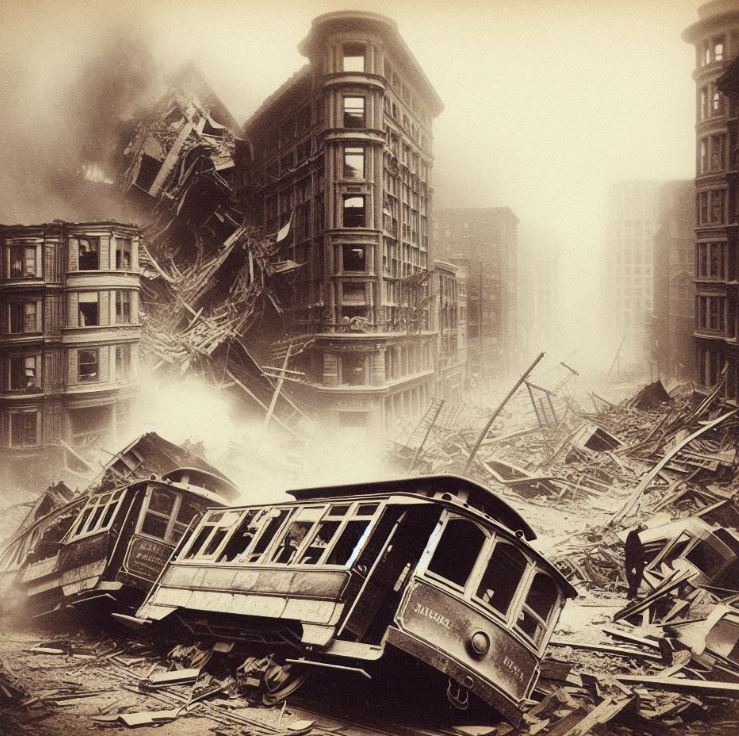San Francisco served as a gateway for early immigrants entering the American mainland. The name San Francisco was given by Spanish explorer Juan Bautista de Anza in 1776, after Francisco Palóu, who led the expedition in 1595 and named it ‘La Bahia de San Francisco’. Following the discovery of gold in 1848, which led to the Gold Rush and the city being referred to as the ‘Golden Gate’, the population surged.
On April 18, 1906, at 5:12 am, San Francisco was hit by a devastating earthquake with a magnitude of 8.3, triggering massive fires that ravaged the entire city for three days and claimed 674 lives. The tightly packed wooden buildings and the destruction of the water mains made firefighting difficult, resulting in over 200,000 refugees.

Survivors spent weeks sleeping in tents or parks. The entire city lay in ruins, and people were plunged into despair. The earthquake, which occurred shortly after many immigrants arrived, was a tremendous shock to the Korean immigrants living in San Francisco or planning to move to the mainland from Hawaii. Fortunately, there were around 50 Korean victims, but no fatalities. When the Sang-Hang Church, where 15 Koreans resided, was damaged, the Relief Department of the Methodist Church provided shelter for them. Another 40 Korean victims were reported to have moved their livelihoods to Oakland.
According to records, the Korean Public Association Building, the Daedong Hall, and the worship hall suffered losses, with 53 compatriots affected by the disaster. Firefighting cars from Oakland, Alameda, and Berkeley came to help due to a shortage of firefighters. After the earthquake, many people moved to Sacramento.
The Korean daily newspaper, Daehan Maeil Shinbo, reported that the Japanese Governor-General’s Office received a report from the Japanese consulate in San Francisco stating that there were about 24 Korean fatalities and 80 victims. The newspaper also reported that the Korean government distributed relief funds of 4,000 won through the Japanese consulate to compatriots. However, the Korean Public Association, upon belatedly learning of this news, firmly stated that the situation was different from what was reported and that they would not accept relief funds distributed through the Japanese consulate. They subsequently investigated compatriots who received relief funds through the Japanese consulate and issued a firm statement rejecting Japan’s approach and interference in the Korean community in North America. A copy of this statement was sent to Daehan Maeil Shinbo.<Statement>
We, the North American Korean Public Association, hope to see this notice published in Daehan Maeil Shinbo. The Korean government has sent 4,000 won in relief funds through the Japanese consulate to help compatriots affected by the disaster in San Francisco. However, as we refuse any interference from foreign powers, we will not accept relief funds distributed by the Japanese consulate.
We have rejected Japanese interference in our affairs on several occasions in the past, and even in times of hardship, we must refuse Japanese interference, even if we face starvation. We have cooperated with Koreans in Hawaii and must maintain our principles. Even if our association and newspaper facilities are delayed and our compatriots face difficulties, we will not accept relief funds distributed through the Japanese consulate.
June 24, 1906
Chairman of the North American Korean Public Association, Song Seok-jun
The association also sent someone to the Japanese consulate to ask, “Why did you falsely report to the Governor-General’s Office that there were Korean casualties in San Francisco and why are you interfering in Korean affairs?” In response, the Japanese consulate stated that while general information about the earthquake was reported to the Japanese Ministry of Foreign Affairs, there was no report to the Governor-General’s Office about Korean casualties.
Furthermore, they mentioned that they had provided 500 yen, 13 bales of rice, and 3 barrels of soy sauce to Pastor Moon Kyung-ho of the worship hall on May 10 for Korean relief efforts. However, they added that this incident had already passed, and they would not interfere with Korean affairs in the future.
During the examination session, Pastor Moon initially denied the facts. Moon, who was conducting church activities at a house on Ellis St. in San Francisco, continued to deny the allegations for 10 days. Eventually, he confessed to receiving relief items from the Japanese consulate.
Association officials demanded that Moon return the relief items to the Japanese consulate, but Moon refused. Consequently, association officials judged Moon as a pro-Japanese collaborator and embezzler and he disappeared thereafter.
Japan’s plan to obscure the spirit of patriotism by taking advantage of the Korean community’s plight failed, and when news of the incident spread domestically, the Korean government changed its plan to send relief funds through the Japanese consulate.
Emperor Gwangmu instructed Pastor Brown of the New York Mission Department to send $1,900 in relief funds to Koreans through American missionary Lacline in San Francisco. With this money, the association rebuilt its building and set up a temporary office at 1230 Oakland 7th Avenue. The Korean Daily News collected a subscription fee of $592.50 and sent it to the honorary consul in San Francisco. Instead, Dr. Juushi of the Immigration Department received the commission and distributed it to Koreans.


Leave a Reply